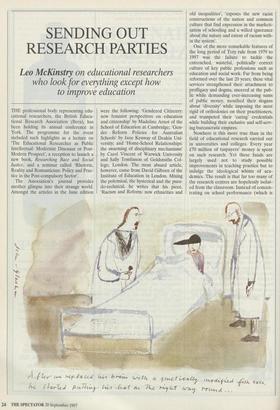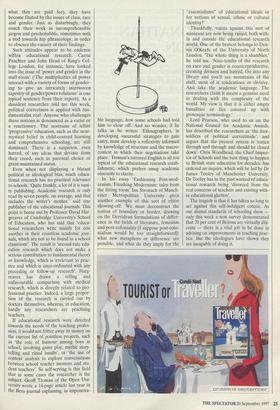SENDING OUT RESEARCH PARTIES
Leo McKinstry on educational researchers
who look for everything except how to improve education
THE professional body representing edu- cational researchers, the British Educa- tional Research Association (Bera), has been holding its annual conference in York. The programme for the event included such highlights as a lecture on `The Educational Researcher as Public Intellectual: Modernist Dinosaur or Post- Modern Prospect', a reception to launch a new book, Researching Race and Social Justice, and a seminar called 'Rhetoric, Reality and Romanticism: Policy and Prac- tice in the Post-compulsory Sector'.
The Association's journal provides another glimpse into their strange world. Amongst the articles in the June edition were the following: `Gendered Citizenry: new feminist perspectives on education and citizenship' by Madeline Amot of the School of Education at Cambridge; 'Gen- der Reform Policies for Australian Schools' by Jane Kenway of Deakin Uni- versity; and 'Home-School Relationships: the swarming of disciplinary mechanisms' by Carol Vincent of Warwick University and Sally Tomlinson of Goldsmiths Col- lege, London. The most absurd article, however, came from David Gilborn of the Institute of Education in London. Mixing the polemical, the hysterical and the pseu- do-technical, he writes that his piece, `Racism and Reform: new ethnicities and old inequalities', 'exposes the new racist constructions of the nation and common culture that find expression in the marketi- sation of schooling and a willed ignorance about the nature and extent of racism with- in the system'.
One of the more remarkable features of the long period of Tory rule from 1979 to 1997 was the failure to tackle the entrenched, wasteful, politically correct culture of key public professions such as education and social work. Far from being reformed over the last 20 years, these vital services strengthened their attachment to profligacy and dogma, sneered at the pub- lic while demanding ever-increasing sums of public money, mouthed their slogans about 'diversity' while imposing the most rigid of orthodoxies on their practitioners, and trumpeted their 'caring' credentials while building their exclusive and self-serv- ing bureaucratic empires.
Nowhere is this more true than in the field of educational research carried out in universities and colleges. Every year £70 million of taxpayers' money is spent on such research. Yet these funds are largely used not to study possible improvements in teaching practice but to indulge the ideological whims of aca- demics. The result is that far too many of the research centres are hopelessly isolat- ed from the classroom. Instead of concen- trating on school performance (which is what they are paid for), they have become fixated by the issues of class, race and gender. Just as disturbingly, they couch their work in incomprehensible jargon and psychobabble, sometimes with a nod towards hip phraseology, in order to obscure the vacuity of their findings.
Such attitudes appear to be endemic within educational research. Carrie Peachter and John Head of King's Col- lege London, for instance, have looked into the issue of 'power and gender in the staff-room' (`The multiplicities of power interact with a variety of forms of gender- ing to give an intricately interwoven tapestry of gender/power relations' is one typical sentence from their report). As a dissident researcher told me this week, political correctness is applied with fun- damentalist zeal. Anyone who challenges these notions is denounced as a racist or a reactionary. The nostrums of leftist `progressive' education, such as the near- mystical belief in child-centred learning and comprehensive schooling, are still dominant. There is a suspicion, even hatred, of any ideas that deviate from their creed, such as parental choice or grant-maintained status.
Even when not displaying a blatant political or ideological bias, much educa- tional research has no practical relevance to schools. 'Quite frankly, a lot of it is vani- ty publishing. Academic research is only read by seven people, on average, and that includes the writer's mother,' said one publisher of the educational journals. This point is borne out by Professor David Har- greaves of Cambridge University's School of Education, who has said that 'educa- tional researchers write mainly for one another in their countless academic jour- nals, which are not to be found in a school classroom'. The result is 'second-rate edu- cation research which does not make a serious contribution to fundamental theory or knowledge, which is irrelevant to prac- tice and which is unco-ordinated with any preceding or follow-up research'. Harg- reaves has drawn a telling and unfavourable comparison with medical research, which is directly related to pro- fessional practice. Indeed, a large propor- tion of the research is carried out by doctors themselves, whereas, in education, hardly any researchers are practising teachers.
If educational research were directed towards the needs of the teaching profes- sion, it would not fritter away its money on the current list of pointless projects, such as 'the role of humour among boys at school, involving game play, mythic story- telling and ritual insults', or 'the use of content analysis to explore conversations between school teacher mentors and stu- dent teachers'. So self-serving is this field that in some cases the researcher is the subject. Geoff Troman of the Open Uni- versity wrote a 14-page article last year in the Bera journal explaining, in impenetra- ble language, how some schools had told him to clear off. And no wonder, if he talks as he writes: 'Ethnographers, in developing successful strategies to gain entry, must develop a reflexivity informed by knowledge of structure and the macro- context in which their negotiations take place.' Troman's tortured English is all too typical of the educational research estab- lishment, which prefers smug academic obscurity to clarity.
In his essay 'Fashioning Post-mod- ernism, Finishing Modernism: tales from the fitting room' Ian Stronach of Manch- ester Metropolitan University gives another example of this sort of elitist showing-off: 'We must deconstruct the notion of boundary or border, drawing on the Derridean formulations of differ- ence in the fields of literature, feminism and post-coloniality [I suppose post-colo- nialism would be too straightforward]: what new metaphors or difference are possible, and what do they imply for the "essentialisms" of educational ideals or for notions of sexual, ethnic or cultural identity?'
Thankfully, voices against this sort of nonsense are now being raised, both with- in and outside the educational research world. One of the bravest belongs to Den- nis O'Keefe of the University of North London. 'The whole thing is a shambles,' he told me. `Nine-tenths of the research on race and gender is counterproductive, creating division and hatred. Go into any library and you'll see mountains of the stuff, most of it tendentious or divisive. And take the academic language. The researchers claim it meets a genuine need in dealing with the complexity of the world. My view is that it is either empty banalities or lies covered up with grotesque terminology.'
Lord Pearson, who used to sit on the National Council for Academic Awards, has described the researchers as 'the foot- soldiers of political correctitude', and argues that the present system is 'rotten through and through and should be closed down'. Chris Woodhead, the Chief Inspec- tor of Schools and the best thing to happen to British state education for decades, has ordered an inquiry, which will be led by Dr James Tooley of Manchester University. Dr Tooley has in the past warned of educa- tional research being 'divorced from the real concerns of teachers and existing with- in educational ghettos'.
The tragedy is that it has taken so long to act against this self-indulgent coterie. As our dismal standards of schooling show only this week a new survey demonstrated that 20 per cent of Britons are virtually illit- erate — there is a vital job to be done in advising on improvements in teaching prac- tice. But the ideologues have shown they are incapable of doing it.



































































 Previous page
Previous page